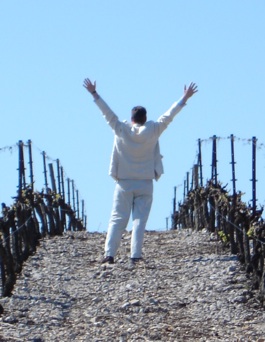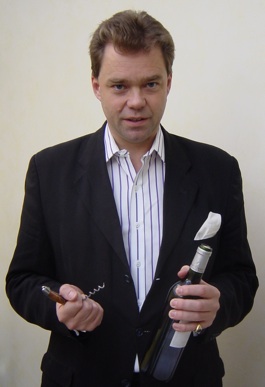The Soul of Musar
12 January 2015 Filed in: Food & Wine
THE SOUL OF MUSAR
NOTE: This is the exact text of an article I wrote about Serge Hochar and Musar nearly 15 years ago.
Chateau Musar from the Lebanon has long been regarded as one of the most individual, even idiosyncratic, wines in the world. Raymond Blake meets Serge Hochar, the man behind Musar.
Friday 4th September 1992. Exactly 10 years before the publication of this issue of Food & Wine. Myself and a couple of like-minded friends gather in one of our houses for dinner. Four red wines are served blind. Our host tells us that they are all from the 1978 vintage but no more. Then the fun begins. A quartet of glasses containing a sample of each wine is carefully arranged in front of each diner. Much swirling and sniffing, slurping and swallowing is followed by baffled, helpless silence. Michael Broadbent’s old adage about a glimpse of the label being worth 50 years’ experience in blind tasting sticks obstinately in my mind. Surreptitiously I glance around the room looking for clues. An empty bottle would be too much to hope for but perhaps a cork? Or even a stray bit of foil from one of the capsules? Not a hope, our host is a thoroughgoing individual and has done his job well.
I remember that we were unanimous about which wine we preferred and some wild and erroneous guesses were made as to its identity. Then somewhere out of the haze of confusion and conflicting thoughts I felt I discerned something familiar and with a certainty more assumed than real I announced that the wine in question was Chateau Musar. We were all taken somewhat aback by the fact that I was right and were practically bowled over when we discovered the pedigree of the wines we preferred it to: Chateaux Lynch-Bages, Ducru-Beaucaillou and Leoville Las Cases, all classed growth clarets with stellar reputations. If truth be told I think we all contemplated some furious back pedalling at this point but good sense prevailed and instead we revelled in the quality of the Musar. The Ducru and the Lynch-Bages were good too though the Leoville was adjudged to be below par. The evening, however, belonged to Musar.
Founded in 1930 by Lebanese businessman and banker Gaston Hochar, Chateau Musar is now run by his sons Serge and Ronald, and his grandson Gaston. The winery and cellars are still housed in the 18th century castle in Ghazir, chosen by Gaston senior in 1930, some 15 miles north east of Beirut. The cellars house over one million bottles of maturing wine right back to and including the first vintage, 1933. Today Serge Hochar explains that his father’s decision to establish Musar was prompted by disillusionment with the banking business: “I think he was very disappointed with the banking problems which happened after the first world war, many people did not pay back the money.” Nevertheless Hochar senior did not confine himself to the wine business and today Serge Hochar is the same: “I am a civil engineer, I am a promoter, I am in real estate, the wine business is one side of my business… I am a philosopher of the wine business.” A major understatement if ever there was one.
Try getting him to talk about any of the usual topics on the rota that forms the bread and butter of any interview with a winemaker and he will dabble with the subject before slipping away to more favoured areas like the true meaning of life. His interest in philosophy stems from the time, in 1964, when he had to spend three months in bed recovering from a broken femur. “I read all the books of philosophy I could and I learned; but basically I did not want to have work myself. I wanted to be a hermit in the mountains, I wanted to retire and observe the universe with no link to those things…” However, due to the fact that he was the eldest, the more prosaic concerns of running the family winery held sway and do so to this day. Hochar had taken over from his father in 1958 in a most emphatic fashion. When asked by the older man what it would take to get him involved, the son replied: “I want to be an engineer I don’t want to be in the wine business. If you want me to take over the winery – you leave.” His father acquiesced with what his son now acknowledges was a “blunt” demand, “so I took over with no knowledge of nothing.”
His first vintage was the 1959, a wine he still reckons to be the best he has made. At this time he was still studying engineering and spending his summers in Bordeaux thanks to a long standing family connection, but he had yet to undertake any formal study of oenology. Only when he had qualified as an engineer did he do so. The link with Bordeaux had been established when Ronald Barton of Chateau Leoville-Barton was stationed in Lebanon as a major in the British Army during the second world war. He became very friendly with Gaston Hochar to the point where Hochar named his second son after him. Of course Musar itself is strongly linked to Bordeaux by the fact that one of its component grapes is Cabernet Sauvignon. In some vintages it can carry many of the hallmarks of Bordeaux in terms of elegance and structure, but it also has more opulent richness and warmth, the sort of qualities one might expect from a southern Rhone wine. Which is hardly surprising when it is learned that the other components of the blend are Cinsault and Carignan.
The grapes are grown in Lebanon’s Bekaa Valley and taken by truck across the mountains to the winery in Ghazir. Time was, during that country’s civil war, when such an activity was fraught with danger, to the point where no wine was made at all in 1976 and 1984. That Hochar persevered through these grimmest of times says much about his character and the tough core that must rest beneath the gentle and affable exterior. The vineyards lie at an altitude of about 3000 feet, which helps to mitigate the high summer temperatures. For the journey to the winery some sulphur is added to the grapes to keep them in good condition but apart from that the winemaking is resolutely simple. One sentence neatly encapsulates Hochar’s approach: “When you are a winemaker you have the luck to work with something that is alive and you should never kill it.” There is no chaptalisation, no adding of acid, no fining or filtering. Fermentation takes place in concrete vats and the wine spends an extended time in them before being transferred to French oak barriques from Nevers for anything between 12 and 24 months. Then it is time for another stint in the vats before the separate varietals are blended by Hochar about three years after the harvest. After bottling the wine will be cellared for another couple of years before release. It is next to impossible to get precise details of the complete process from him for he works very much by instinct and does what he wants when he wants. It’s winemaking with a dose of alchemy and perhaps even a touch of wizardry thrown in. Thus there can be quite a noticeable variation in Musar from one year to the next, irrespective of the seasonal differences from vintage to vintage.
Such an approach is admirable when you hear it enunciated by Hochar in person, but bottle variation (particularly amongst bottles from the same vintage) is not something that the modern wine drinker is especially tolerant of. Hochar would point out that each bottle has a life of its own and develops in its own way. Indeed he was completely unperturbed when a bottle of the 1980, served at a tutored tasting in Dublin recently, was found to be seriously out of condition. A second bottle was noticeably better but far from being the best in the tasting. Depending on your taste that accolade belonged to the 1993 or the 1995. The older wine had a rich, savoury nose and a delicious, mouth-watering succulence on the palate with a finish that was warm and satisfying. Its younger sibling was more perfumed, the palate more elegant and less robust, the finish long and lingering. Both spoke more eloquently than anyone, even Hochar, could about why Musar has been so successful. It has a beguiling, indefinable character that resists pigeon holing. At this time or that it can be likened to one wine or another but in truth it is a true individual and exists in a category of its own. As such it should be cherished. The wine world is galloping headlong towards a future of big brands and not much else. Generally they are competently made but they are also bland and boring and one gets the impression that they are made not so much to please all palates as to offend none. That criticism could never be levelled at Musar.
Today, amongst wine lovers, it is one of the best known wines in the world though it wasn’t always that way. Hochar undertook his first overseas sales trip in 1967: “I took 12 half bottles with me and flew all over Europe, from Finland to Oslo to Ireland… everywhere… and the only place where I succeeded was Ireland.” Establishing a toehold in the export market turned out to be a prescient move: “I was not aware that eight years later the war would happen in my country and that it would be destroyed and I would have no other market than the world.” At the outbreak of the war in 1975 exports accounted for a meagre three per cent of production; by the time it ended in 1991 the situation was reversed and 97 per cent was then going overseas, the lion’s share to the UK. These days about 10 per cent is sold on the home market. Hochar wishes it were more but he is a victim of his own success: “the whole market has exploded… it is sad to say that we are not in Lebanon… but the tendency will be I hope, in a couple of more years, back to something more normal, let’s say 75:25.” It’s an ironic turnaround for Hochar who, when he set out in 1967, had the aim of achieving a 50:50 split between domestic and export markets.
Since then he has carried his message far and wide and in turn the world has beaten a path to his door. He is unique in an age when that term is used with wanton and inaccurate abandon. His approach is refreshingly different. It makes a wonderful change from the legion of winemakers who can only talk about their wines in terms of facts and figures, details that are as dry as tinder and about as interesting. Everything in their world can be precisely measured and controlled, any characteristic of the wine dissected and analysed. I call it “winemaking by numbers”. But does the wine have a soul? Chateau Musar has a soul and its name is Serge Hochar.
Article first published in the September 2002 issue of Food & Wine Magazine, Ireland.
blog comments powered by Disqus

